International Human Rights Law and Climate Change
VerifiedAdded on 2022/10/01
|5
|1009
|89
AI Summary
Explore the role of international human rights law in addressing climate change and protecting individual rights. Learn about the UN Human Rights Treaty bodies, filing complaints, and the importance of global collaboration. Discover how human rights law can help protect vulnerable populations, such as children and women, in the face of climate change. Access essays, dissertations, and assignments on the topic at Desklib.
Contribute Materials
Your contribution can guide someone’s learning journey. Share your
documents today.
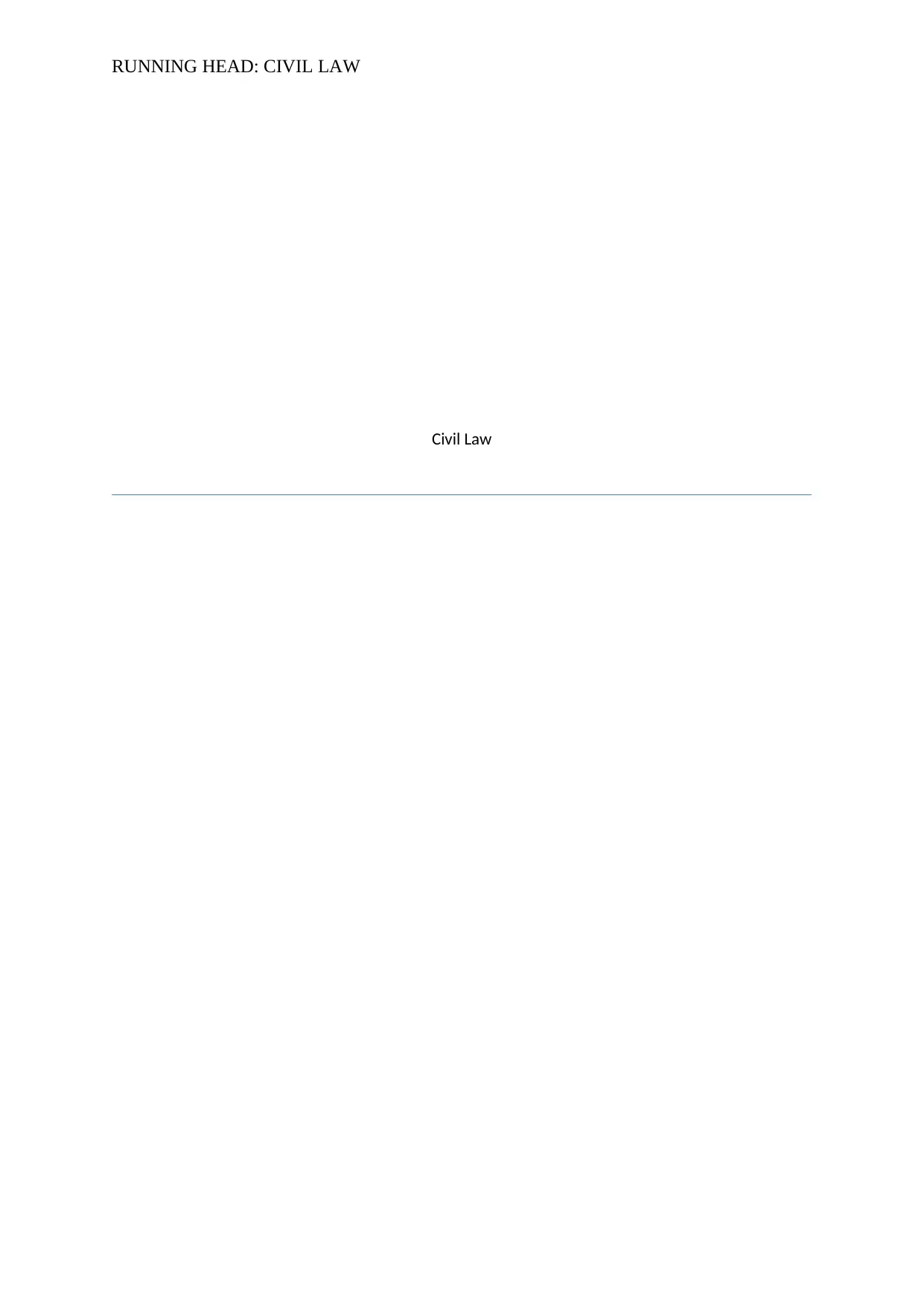
RUNNING HEAD: CIVIL LAW
Civil Law
Civil Law
Secure Best Marks with AI Grader
Need help grading? Try our AI Grader for instant feedback on your assignments.
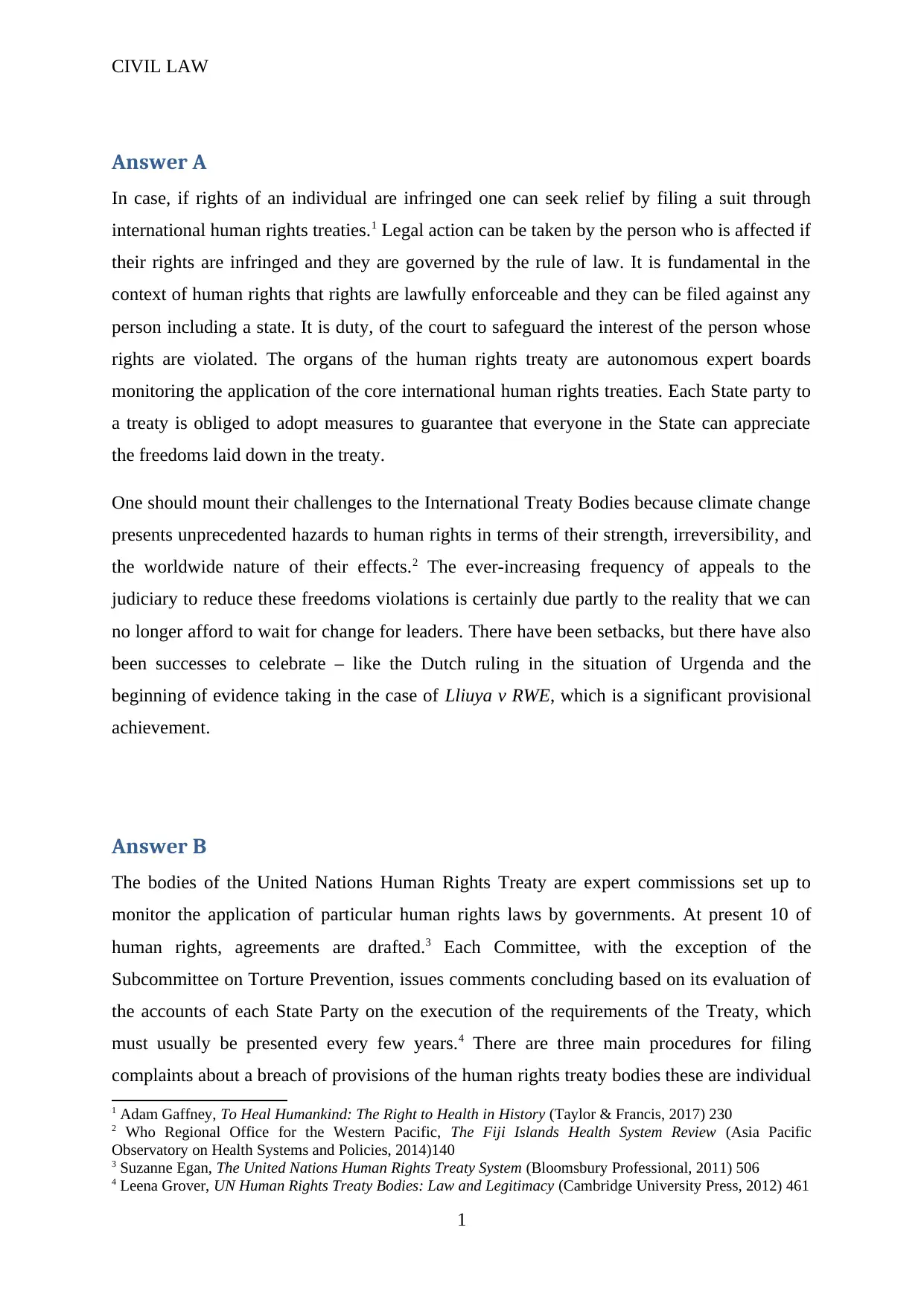
CIVIL LAW
Answer A
In case, if rights of an individual are infringed one can seek relief by filing a suit through
international human rights treaties.1 Legal action can be taken by the person who is affected if
their rights are infringed and they are governed by the rule of law. It is fundamental in the
context of human rights that rights are lawfully enforceable and they can be filed against any
person including a state. It is duty, of the court to safeguard the interest of the person whose
rights are violated. The organs of the human rights treaty are autonomous expert boards
monitoring the application of the core international human rights treaties. Each State party to
a treaty is obliged to adopt measures to guarantee that everyone in the State can appreciate
the freedoms laid down in the treaty.
One should mount their challenges to the International Treaty Bodies because climate change
presents unprecedented hazards to human rights in terms of their strength, irreversibility, and
the worldwide nature of their effects.2 The ever-increasing frequency of appeals to the
judiciary to reduce these freedoms violations is certainly due partly to the reality that we can
no longer afford to wait for change for leaders. There have been setbacks, but there have also
been successes to celebrate – like the Dutch ruling in the situation of Urgenda and the
beginning of evidence taking in the case of Lliuya v RWE, which is a significant provisional
achievement.
Answer B
The bodies of the United Nations Human Rights Treaty are expert commissions set up to
monitor the application of particular human rights laws by governments. At present 10 of
human rights, agreements are drafted.3 Each Committee, with the exception of the
Subcommittee on Torture Prevention, issues comments concluding based on its evaluation of
the accounts of each State Party on the execution of the requirements of the Treaty, which
must usually be presented every few years.4 There are three main procedures for filing
complaints about a breach of provisions of the human rights treaty bodies these are individual
1 Adam Gaffney, To Heal Humankind: The Right to Health in History (Taylor & Francis, 2017) 230
2 Who Regional Office for the Western Pacific, The Fiji Islands Health System Review (Asia Pacific
Observatory on Health Systems and Policies, 2014)140
3 Suzanne Egan, The United Nations Human Rights Treaty System (Bloomsbury Professional, 2011) 506
4 Leena Grover, UN Human Rights Treaty Bodies: Law and Legitimacy (Cambridge University Press, 2012) 461
1
Answer A
In case, if rights of an individual are infringed one can seek relief by filing a suit through
international human rights treaties.1 Legal action can be taken by the person who is affected if
their rights are infringed and they are governed by the rule of law. It is fundamental in the
context of human rights that rights are lawfully enforceable and they can be filed against any
person including a state. It is duty, of the court to safeguard the interest of the person whose
rights are violated. The organs of the human rights treaty are autonomous expert boards
monitoring the application of the core international human rights treaties. Each State party to
a treaty is obliged to adopt measures to guarantee that everyone in the State can appreciate
the freedoms laid down in the treaty.
One should mount their challenges to the International Treaty Bodies because climate change
presents unprecedented hazards to human rights in terms of their strength, irreversibility, and
the worldwide nature of their effects.2 The ever-increasing frequency of appeals to the
judiciary to reduce these freedoms violations is certainly due partly to the reality that we can
no longer afford to wait for change for leaders. There have been setbacks, but there have also
been successes to celebrate – like the Dutch ruling in the situation of Urgenda and the
beginning of evidence taking in the case of Lliuya v RWE, which is a significant provisional
achievement.
Answer B
The bodies of the United Nations Human Rights Treaty are expert commissions set up to
monitor the application of particular human rights laws by governments. At present 10 of
human rights, agreements are drafted.3 Each Committee, with the exception of the
Subcommittee on Torture Prevention, issues comments concluding based on its evaluation of
the accounts of each State Party on the execution of the requirements of the Treaty, which
must usually be presented every few years.4 There are three main procedures for filing
complaints about a breach of provisions of the human rights treaty bodies these are individual
1 Adam Gaffney, To Heal Humankind: The Right to Health in History (Taylor & Francis, 2017) 230
2 Who Regional Office for the Western Pacific, The Fiji Islands Health System Review (Asia Pacific
Observatory on Health Systems and Policies, 2014)140
3 Suzanne Egan, The United Nations Human Rights Treaty System (Bloomsbury Professional, 2011) 506
4 Leena Grover, UN Human Rights Treaty Bodies: Law and Legitimacy (Cambridge University Press, 2012) 461
1
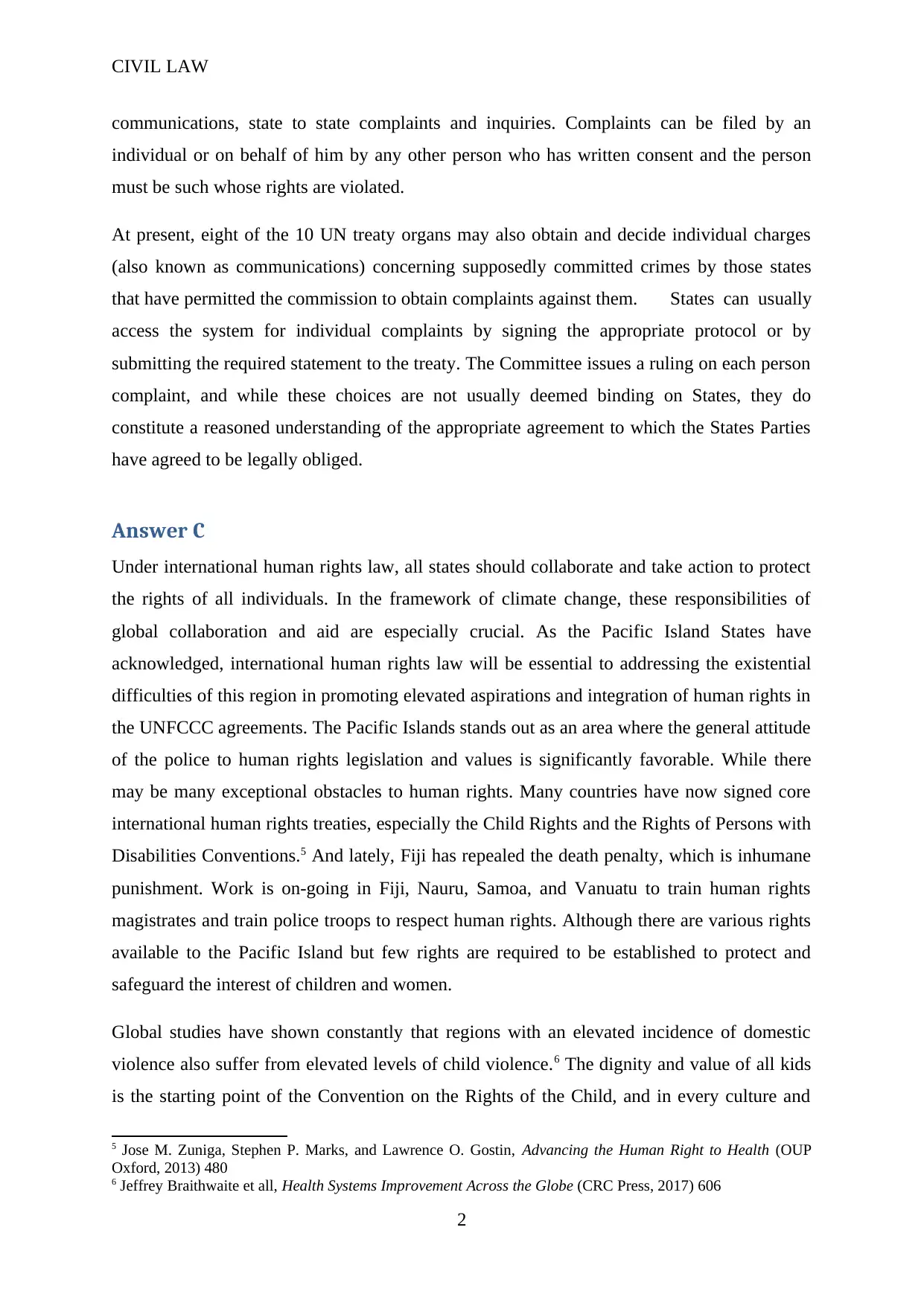
CIVIL LAW
communications, state to state complaints and inquiries. Complaints can be filed by an
individual or on behalf of him by any other person who has written consent and the person
must be such whose rights are violated.
At present, eight of the 10 UN treaty organs may also obtain and decide individual charges
(also known as communications) concerning supposedly committed crimes by those states
that have permitted the commission to obtain complaints against them. States can usually
access the system for individual complaints by signing the appropriate protocol or by
submitting the required statement to the treaty. The Committee issues a ruling on each person
complaint, and while these choices are not usually deemed binding on States, they do
constitute a reasoned understanding of the appropriate agreement to which the States Parties
have agreed to be legally obliged.
Answer C
Under international human rights law, all states should collaborate and take action to protect
the rights of all individuals. In the framework of climate change, these responsibilities of
global collaboration and aid are especially crucial. As the Pacific Island States have
acknowledged, international human rights law will be essential to addressing the existential
difficulties of this region in promoting elevated aspirations and integration of human rights in
the UNFCCC agreements. The Pacific Islands stands out as an area where the general attitude
of the police to human rights legislation and values is significantly favorable. While there
may be many exceptional obstacles to human rights. Many countries have now signed core
international human rights treaties, especially the Child Rights and the Rights of Persons with
Disabilities Conventions.5 And lately, Fiji has repealed the death penalty, which is inhumane
punishment. Work is on-going in Fiji, Nauru, Samoa, and Vanuatu to train human rights
magistrates and train police troops to respect human rights. Although there are various rights
available to the Pacific Island but few rights are required to be established to protect and
safeguard the interest of children and women.
Global studies have shown constantly that regions with an elevated incidence of domestic
violence also suffer from elevated levels of child violence.6 The dignity and value of all kids
is the starting point of the Convention on the Rights of the Child, and in every culture and
5 Jose M. Zuniga, Stephen P. Marks, and Lawrence O. Gostin, Advancing the Human Right to Health (OUP
Oxford, 2013) 480
6 Jeffrey Braithwaite et all, Health Systems Improvement Across the Globe (CRC Press, 2017) 606
2
communications, state to state complaints and inquiries. Complaints can be filed by an
individual or on behalf of him by any other person who has written consent and the person
must be such whose rights are violated.
At present, eight of the 10 UN treaty organs may also obtain and decide individual charges
(also known as communications) concerning supposedly committed crimes by those states
that have permitted the commission to obtain complaints against them. States can usually
access the system for individual complaints by signing the appropriate protocol or by
submitting the required statement to the treaty. The Committee issues a ruling on each person
complaint, and while these choices are not usually deemed binding on States, they do
constitute a reasoned understanding of the appropriate agreement to which the States Parties
have agreed to be legally obliged.
Answer C
Under international human rights law, all states should collaborate and take action to protect
the rights of all individuals. In the framework of climate change, these responsibilities of
global collaboration and aid are especially crucial. As the Pacific Island States have
acknowledged, international human rights law will be essential to addressing the existential
difficulties of this region in promoting elevated aspirations and integration of human rights in
the UNFCCC agreements. The Pacific Islands stands out as an area where the general attitude
of the police to human rights legislation and values is significantly favorable. While there
may be many exceptional obstacles to human rights. Many countries have now signed core
international human rights treaties, especially the Child Rights and the Rights of Persons with
Disabilities Conventions.5 And lately, Fiji has repealed the death penalty, which is inhumane
punishment. Work is on-going in Fiji, Nauru, Samoa, and Vanuatu to train human rights
magistrates and train police troops to respect human rights. Although there are various rights
available to the Pacific Island but few rights are required to be established to protect and
safeguard the interest of children and women.
Global studies have shown constantly that regions with an elevated incidence of domestic
violence also suffer from elevated levels of child violence.6 The dignity and value of all kids
is the starting point of the Convention on the Rights of the Child, and in every culture and
5 Jose M. Zuniga, Stephen P. Marks, and Lawrence O. Gostin, Advancing the Human Right to Health (OUP
Oxford, 2013) 480
6 Jeffrey Braithwaite et all, Health Systems Improvement Across the Globe (CRC Press, 2017) 606
2
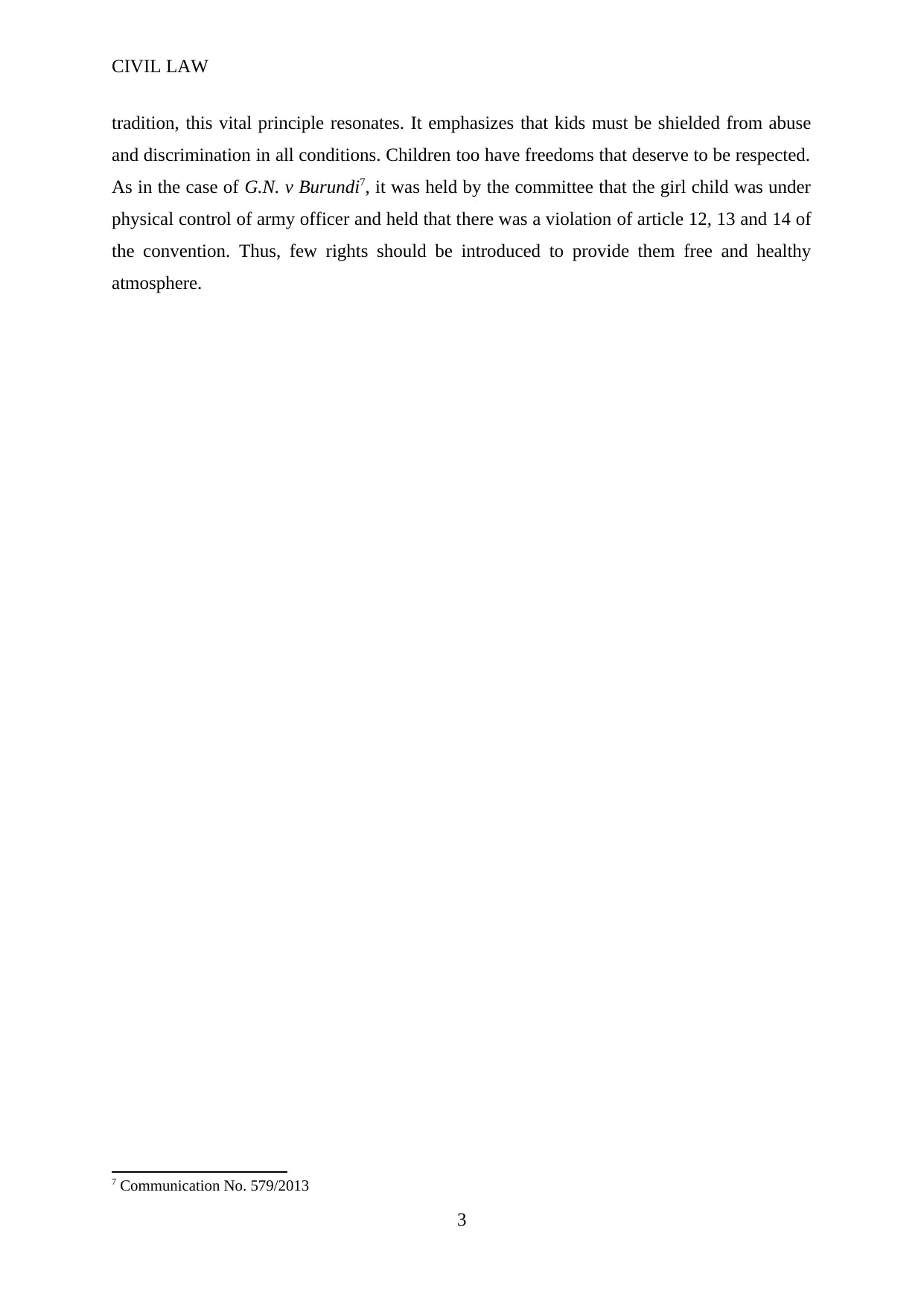
CIVIL LAW
tradition, this vital principle resonates. It emphasizes that kids must be shielded from abuse
and discrimination in all conditions. Children too have freedoms that deserve to be respected.
As in the case of G.N. v Burundi7, it was held by the committee that the girl child was under
physical control of army officer and held that there was a violation of article 12, 13 and 14 of
the convention. Thus, few rights should be introduced to provide them free and healthy
atmosphere.
7 Communication No. 579/2013
3
tradition, this vital principle resonates. It emphasizes that kids must be shielded from abuse
and discrimination in all conditions. Children too have freedoms that deserve to be respected.
As in the case of G.N. v Burundi7, it was held by the committee that the girl child was under
physical control of army officer and held that there was a violation of article 12, 13 and 14 of
the convention. Thus, few rights should be introduced to provide them free and healthy
atmosphere.
7 Communication No. 579/2013
3
Secure Best Marks with AI Grader
Need help grading? Try our AI Grader for instant feedback on your assignments.
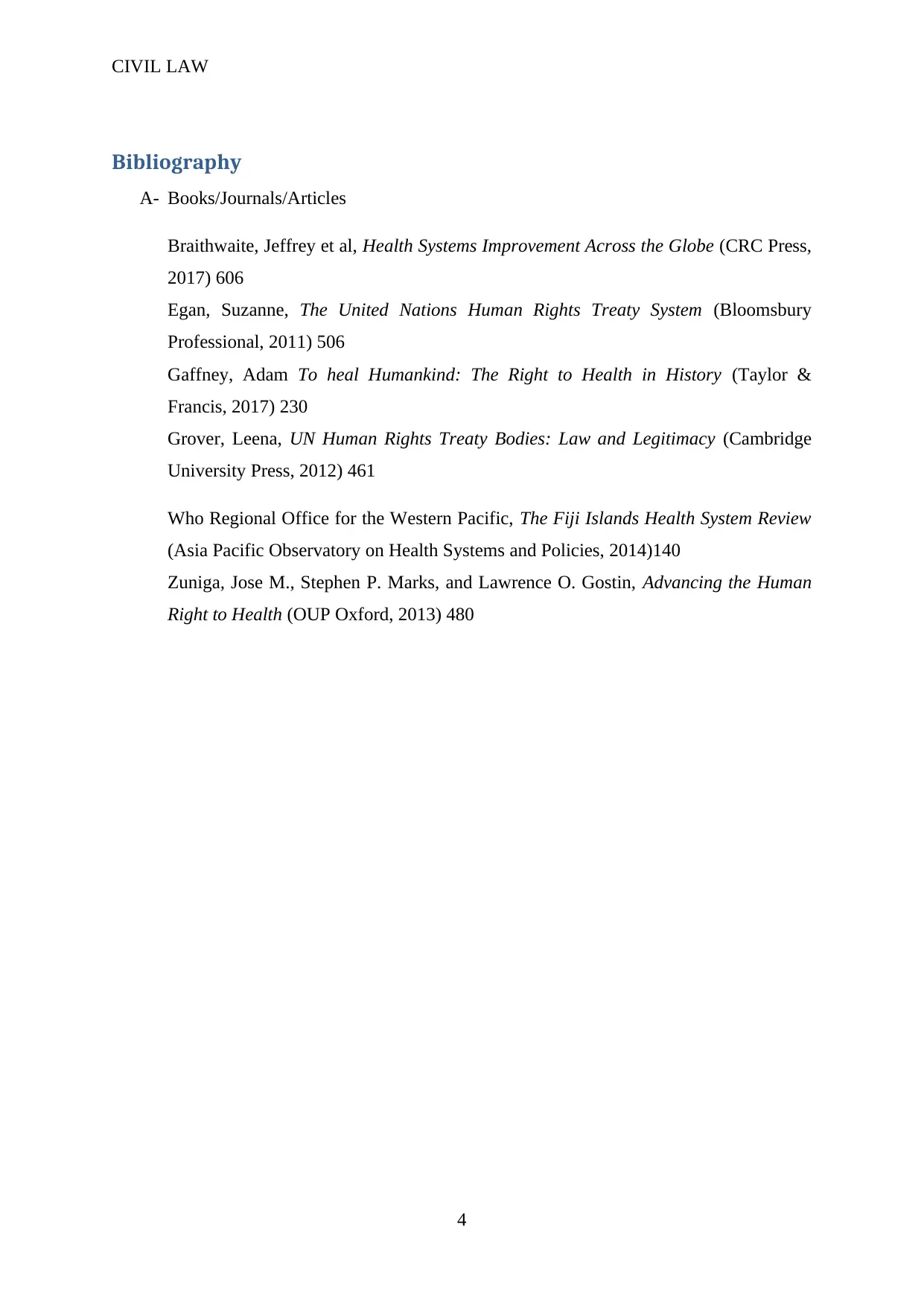
CIVIL LAW
Bibliography
A- Books/Journals/Articles
Braithwaite, Jeffrey et al, Health Systems Improvement Across the Globe (CRC Press,
2017) 606
Egan, Suzanne, The United Nations Human Rights Treaty System (Bloomsbury
Professional, 2011) 506
Gaffney, Adam To heal Humankind: The Right to Health in History (Taylor &
Francis, 2017) 230
Grover, Leena, UN Human Rights Treaty Bodies: Law and Legitimacy (Cambridge
University Press, 2012) 461
Who Regional Office for the Western Pacific, The Fiji Islands Health System Review
(Asia Pacific Observatory on Health Systems and Policies, 2014)140
Zuniga, Jose M., Stephen P. Marks, and Lawrence O. Gostin, Advancing the Human
Right to Health (OUP Oxford, 2013) 480
4
Bibliography
A- Books/Journals/Articles
Braithwaite, Jeffrey et al, Health Systems Improvement Across the Globe (CRC Press,
2017) 606
Egan, Suzanne, The United Nations Human Rights Treaty System (Bloomsbury
Professional, 2011) 506
Gaffney, Adam To heal Humankind: The Right to Health in History (Taylor &
Francis, 2017) 230
Grover, Leena, UN Human Rights Treaty Bodies: Law and Legitimacy (Cambridge
University Press, 2012) 461
Who Regional Office for the Western Pacific, The Fiji Islands Health System Review
(Asia Pacific Observatory on Health Systems and Policies, 2014)140
Zuniga, Jose M., Stephen P. Marks, and Lawrence O. Gostin, Advancing the Human
Right to Health (OUP Oxford, 2013) 480
4
1 out of 5
Related Documents
Your All-in-One AI-Powered Toolkit for Academic Success.
+13062052269
info@desklib.com
Available 24*7 on WhatsApp / Email
![[object Object]](/_next/static/media/star-bottom.7253800d.svg)
Unlock your academic potential
© 2024 | Zucol Services PVT LTD | All rights reserved.




